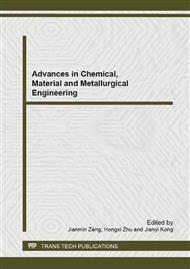[1]
Zang XS, Li YB. 45CrMoV steel austenitic microstructure analysis of air – cooled. Journal of Beijing University of Aeronautics and Astronautics 1993; No3.
Google Scholar
[2]
Yang C, Gao GQ, Wu DX. Relationship between microstructure and corrosion resistance of Q235 Steel treated by low temperature gas multi-component thermochemical treatment technology. Mater Prot 2004;37:42-4
Google Scholar
[3]
Cui GD, Yang C, Cheng HM. Microstructure and properties of 38CrMoAl steel treated by gas oxynitriding. Heat Treated Met 2008;33;46-8.
Google Scholar
[4]
Zhou H. Chen F, Yao B. Zhong XF.Research on the properties of inside surface of subsurface pump barrel by N-C-O multi-elements penetrating. Surf Coat Technol 2007;201:5156-67.
DOI: 10.1016/j.surfcoat.2006.07.136
Google Scholar
[5]
Zhang JW, Lu LT, Cui GD, Shen XL, Yi HF, Zhang WH. Effect of process temperature on the microstructure and properties of gas oxynitrocarburized 35CrMo alloy steel.Materials and Design 31(2010);2654-2658.
DOI: 10.1016/j.matdes.2009.11.068
Google Scholar
[6]
Du H, Somers Marcel AJ, Agren J. Microstructural and compositional evolution of compound layers during gaseous nitrocarburizing. Metal Mater Trans A2000;31:195–211.
DOI: 10.1007/s11661-000-0065-7
Google Scholar
[7]
Ashrafizadeh F. Influence of plasma and gas nitriding on fatigue resistance of plain carbon (Ck45) steel. Surf Coat Technol 2003;173–174:1196–200.
DOI: 10.1016/s0257-8972(03)00460-2
Google Scholar
[8]
Suh CM, Hwang JK, Son KS, Jang HK. Fatigue characteristics of nitrided SACM645 according to the nitriding condition and notch. Mater Sci Eng A2005;392:31–7.
DOI: 10.1016/j.msea.2004.07.066
Google Scholar
[9]
Mridha S, Khan AA. The effects of process variables on the hardness of nitrided3% chromium steel. J Mater Process Technol 2008;201:325–30.
Google Scholar
[10]
Gu JF, Bei DH, Pan JS, Lu J, Lu K. Improved nitrogen transport in surfacenanocrystallized low-carbon steels during gaseous nitridation. Mater Lett2002;55:340–3.
DOI: 10.1016/s0167-577x(02)00389-0
Google Scholar
[11]
Peng J, Dong H. Effect of rare earth elements on plasma nitriding of 38CrMoAlsteel. Surf Eng 1996;12:147–51.
Google Scholar
[12]
Maliska AM, Egert P, Souza ARDE, Speller CV, Klein AN. Influence of oxygen in aplasma nitriding process. J Mater Sci 1997;32:6375–82.
Google Scholar
[13]
Hoppe S. Fundamentals and applications of the combination of plasmanitrocarburizing and oxidizing. Surf Coat Technol 1998;98:1199–204.
Google Scholar
[14]
Li CH, Dong H, Bell T. A feasibility study of plasma nitriding of steel with anoxide layer on the surface. J Mater Sci 2006;41:6116–8.
DOI: 10.1007/s10853-006-0484-y
Google Scholar
[15]
Lee I. Post-oxidizing treatments of the compound layer on the AISI 4135 steelproduced by plasma nitrocarburizing. Surf Coat Technol 2004;188–189:669–74.
DOI: 10.1016/j.surfcoat.2004.07.093
Google Scholar
[16]
Doche ML. Improvement of the corrosion resistance of low-pressure nitride and post-oxidized steels by a polymer impregnation final treatment. Surf CoatTechnol 2002;154:113–23.
DOI: 10.1016/s0257-8972(01)01707-8
Google Scholar
[17]
Lee KH, Nam KS, Shin PW, Lee DY, Song YS. Effect of post-oxidizing time on corrosion properties of plasma nitrocarburized AISI 1020 steel. Mater Lett2003;57:2060–5.
DOI: 10.1016/s0167-577x(02)00709-7
Google Scholar
[18]
Yang C, Gao GQ, Wu DX. Relationship between microstructure and corrosion resistance of Q235 Steel treated by low temperature gas multi-componentther mochemical treatment technology. Mater Prot 2004;37:42–4.
Google Scholar
[19]
Cui GD, Yang C, Cheng HM. Microstructure and properties of 38CrMoAl steeltreated by gas oxynitriding. Heat Treat Met 2008;33:46–8.0[20] Zhou H, Chen F, Yao B, Zhong XF. Research on the properties of inside surfaceof subsurface pump barrel by N–C–O multi-elements penetrating. Surf CoatTechnol 2007;201:5156–67.
DOI: 10.1016/j.surfcoat.2006.07.136
Google Scholar
[20]
Babul T, Nakonieczny A, Senatorski J, Kucharieva N. Structure and properties of nitrocarburized diffusion layers generated on high-speed steels. J Mater Eng Perform 2003; 12:696–700.2
DOI: 10.1361/105994903322692501
Google Scholar
[21]
Karakan M, Alsaran A, Mlik A. Effect of process time on structural andtribological properties of ferritic plasma nitrocarburized AISI 4140 steel. Mater Des 2004;25:349–53.
DOI: 10.1016/j.matdes.2003.10.017
Google Scholar
[22]
Brien MJO, Goodman D. Plasma (ion) nitriding. ASM handbook, vol. 4. Metals Park (OH): American Society for Metals; 1991. p.420–4.
Google Scholar
[23]
Fu Ricky KY, Tang DL, Wan GJ, Chu Paul K. Enhancement of corrosion resistance of AISI 420 stainless steels by nitrogen and silicon plasma immersion ion implantation. Surf Coat Technol 2007;201:4879–83.
DOI: 10.1016/j.surfcoat.2006.07.077
Google Scholar
[24]
Lakhtin Yu M. Chemicothermal treatment oxynitriding (nitrooxidizing). Met Sci Heat Treat 1994;36:445–51.
DOI: 10.1007/bf01395901
Google Scholar


